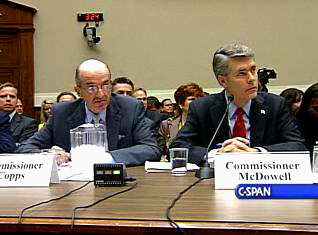Legislators Press for Spectrum Inventory

WASHINGTON: It’s rare to get agreement across party lines on Capitol Hill, but that was the case this morning when it came to radio frequency spectrum. Legislators and regulators alike agreed that an inventory was in order. The issue arose during a House subcommittee hearing on oversight of the FCC. The five commissioners appeared before the Subcommittee on Communications, Technology and the Internet. The FCC’s charter to develop a nationwide broadband plan is getting the most play at the commission, but spectrum is integrally linked, as Chairman Julius Genachowski noted.
“There is a demand crunch coming,” he said in response to a query from Rep. Joe Barton (R-Texas) about available spectrum and D block licenses that failed to attract sufficient bids. “I would welcome passage of the inventory bill. With respect to the D block, that we can get on the market soon. The challenge of the public safety component is a problem. The D block comes up often in connection with our broadband plan.”
The D block refers to a swatch of spectrum in the 700 MHz band, freed up after the June 12 digital television transition. The FCC designated conditions on D block to create what it hoped would be a public-private partnership by which first responders could use the space. It was offered up as a nationwide, singe license. The unrestricted 700 MHz licenses brought $19 billion; the D block remains undesignated.
No second auction has been scheduled for the D block, but Genachowski told Barton proposals would be put forth “no later than February,” in conjunction with the FCC’s broadband plan.
A lack of spectrum, vis-à-vis its use by broadcasters for the DTV transition, was blamed by some for the deaths of first responders during the events of 9/11. Experts countered the premise, noting the disparity in terms, protocols and the types of radios used by first responders. The perception nonetheless stuck, prompting hostility toward the broadcast industry, and the creation of the D block.
Rather than wait for a buyer to step forward for the D block, the U.S. Department of Homeland Security has begun trials to test multiband radios, Scientific American’s Larry Greenemeier reports.
“Several manufacturers are developing multiband radios, but currently only a version made by Thales Communications in Clarksburg, Md., meets criteria set by Homeland Security--that is, the device is roughly the same size and weight as the radios that police and other responders carry today, and it costs no more than $5,000, similar to the high-end single-band radios now on the market,” he wrote.
Amtrak, Washington, D.C.’s Metro system, the U.S. Olympic Planning Committee and 11 more agencies tested the Thales radios over the summer; published results are expected early next year. (See “Radio for Responders: Public Safety Bandwidth Goes Unused.”)
At the FCC oversight hearing, all the commissioners welcomes legislation directing the agency to conduct a spectrum inventory. Subcommittee Chairman Rick Boucher (D-Va.) and some colleagues introduced such a bill over the summer, H.R. 3125, the Radio Spectrum Inventory Act. It would require the FCC and the National Telecommunications and Information Administration to provide Congress with an annual report on spectrum use and availability.
A similar bill was passed by the Senate Commerce Committee in July. S.649 requires a biennial inventory. It’s been placed on the Senate calendar of business for an eventual floor vote, according to Govtrack.
While all commissioners were on board for an inventory, some urged restraint on assumptions about shortages.
“We have a lot of spectrum not built out yet,” Commissioner Robert McDowell said. “We have the AWF-1 auction from 2006, not online yet. We had the 700 MHz auction, that’s not built out. Let’s be careful what we want to do... let’s not micromanage that spectrum.”
He also offered that spectral efficiency doubles every few years with advances in compression and other communications technology.
McDowell’s Republican colleague, Meredith Attwell Baker, noted the need for more “efficient, transparent spectrum policy,” but that the Defense Advanced Research Projects Agency “spends more money in this area than anyone else.” She reiterated McDowell’s point about spectrum in the process of being utilized, “but we need to lay out the steps that come after that.”
More on spectrum legislation:
July 13, 2009: “Boucher Proffers House Spectrum Bill”
Lawmakers in the House of Representatives have rolled out a bill that would initiate a radio spectrum inventory. The measure would direct the National Telecommunications and Information Administration and the Federal Communication Commission to do a comprehensive survey of the spectrum. The goal is to update who and what agencies are using bandwidth, how they’re using it, and where the gaps are, if any remain. The nation’s airwaves are notoriously crowded, hence the push in recent years to open up broadcast taboo channels to unlicensed devices.
Get the TV Tech Newsletter
The professional video industry's #1 source for news, trends and product and tech information. Sign up below.
